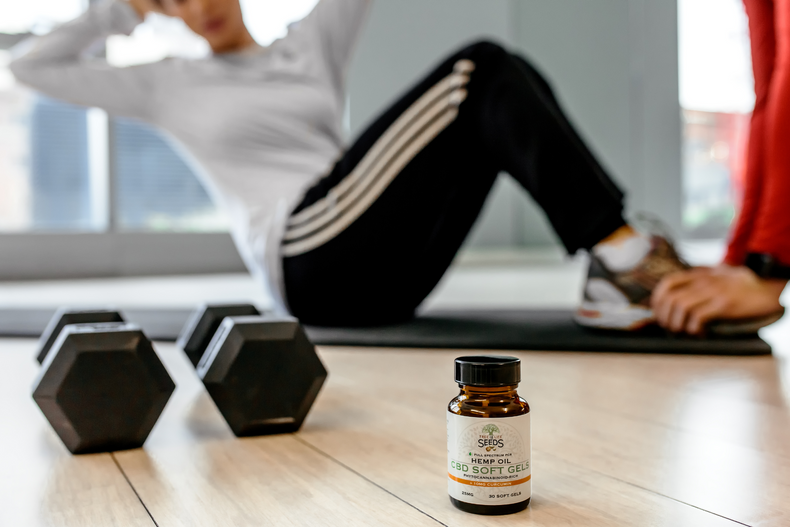Exercise recovery is a critical aspect of maximizing performance and minimizing muscle soreness. As athletes and fitness enthusiasts strive to optimize their training routines, CBD has emerged as a promising natural aid for exercise recovery. With its anti-inflammatory properties and potential benefits for muscle relaxation, CBD has garnered attention in the fitness community. In this comprehensive blog post, we will delve into the depths of CBD's ability to enhance exercise recovery, reduce muscle soreness, and support overall muscle health.
Understanding Exercise Recovery
Before exploring the potential benefits of CBD for exercise recovery, it is essential to grasp the importance of post-workout recovery. After intense physical activity, the body undergoes a series of processes to repair and rebuild muscles. Proper exercise recovery enables muscle growth, reduces the risk of injury, and prepares the body for subsequent workouts. However, common challenges such as muscle soreness and inflammation can hinder this recovery process.
How CBD Supports Exercise Recovery
CBD, short for cannabidiol, is a naturally occurring compound found in the cannabis plant. It interacts with the endocannabinoid system (ECS) in the body, which plays a vital role in regulating various physiological processes. CBD's potential anti-inflammatory effects and reduction of oxidative stress make it a promising candidate for exercise recovery. By mitigating inflammation, CBD may help accelerate the healing process and alleviate exercise-induced muscle damage.
Research suggests that CBD's interaction with the ECS may also contribute to muscle relaxation. The ECS regulates muscle tension, and CBD's influence on this system may help promote relaxation and reduce muscle tension following intense physical activity. Additionally, CBD may impact sleep quality, leading to improved muscle recovery during rest periods.
Reducing Muscle Soreness with CBD
One of the primary challenges in exercise recovery is muscle soreness, also known as delayed onset muscle soreness (DOMS). CBD has shown potential analgesic effects, meaning it may help alleviate pain and discomfort associated with muscle soreness. By targeting pain receptors in the body, CBD could offer a natural alternative to traditional pain relief methods, reducing the reliance on over-the-counter medications.
Although scientific studies on CBD's specific impact on exercise-induced muscle soreness are limited, anecdotal evidence and athlete testimonials highlight its potential efficacy. Many athletes report faster recovery times and reduced muscle soreness after incorporating CBD into their exercise recovery routines. These personal accounts provide valuable insights into CBD's benefits, indicating its potential as a viable option for managing exercise-induced pain.
CBD and Muscle Relaxation
Muscle tension is a common issue experienced by athletes and fitness enthusiasts. CBD's potential benefits for reducing muscle tension and promoting relaxation make it an appealing supplement for exercise recovery. By influencing the ECS and its regulation of muscle tone, CBD may help relieve tightness and facilitate greater muscle relaxation.
Moreover, CBD's impact on sleep quality can significantly contribute to muscle recovery during rest periods. Quality sleep is essential for proper exercise recovery, and CBD's potential to improve sleep patterns may complement other relaxation techniques like stretching and massage, leading to enhanced muscle repair and growth.
Incorporating CBD into Your Exercise Recovery Routine
When considering CBD for exercise recovery, it is crucial to choose the right products and follow proper dosing guidelines. CBD is available in various forms, including topicals (creams, balms), tinctures (oils), capsules, and edibles. For localized muscle soreness, topicals may provide targeted relief, while tinctures offer a systemic approach.
Determining the optimal CBD dosage depends on individual factors such as exercise intensity, body weight, and personal tolerance. Starting with a low dose and gradually increasing as needed is a recommended approach. Additionally, timing is essential; consuming CBD before a workout may help reduce exercise-induced inflammation, while post-workout consumption could aid in recovery.
Safety Considerations and Potential Interactions
While CBD is generally considered safe, it is essential to prioritize product quality and purity. Look for CBD products that undergo third-party lab testing to ensure they are free from contaminants and accurately labeled. Additionally, be aware of potential interactions between CBD and medications or underlying health conditions. Consulting with a healthcare professional before incorporating CBD into your exercise recovery regimen is advisable, especially if you have pre-existing medical conditions or are taking medications.
CBD holds significant potential as a natural supplement for exercise recovery, offering benefits such as reduced muscle soreness, enhanced relaxation, and overall muscle health support. By integrating CBD into your post-workout routine, adhering to proper dosing guidelines, and prioritizing safety, you have the opportunity to optimize your exercise recovery and maximize your performance. While CBD's effects may vary for individuals, the growing body of research and anecdotal evidence provide a promising foundation for its use in exercise recovery.

